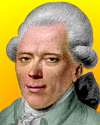 (source)
(source)
|
Georg Christoph Lichtenberg
(1 Jul 1742 - 24 Feb 1799)
German physicist and writer most widely known for his satire and aphorisms, but as a scientist, Lichtenberg did research in a wide variety of fields, including geophysics, volcanology, meteorology, chemistry, astronomy, mathematics, but especially physics. He discovered the basic physical process later used in xerographic copiers.
|
Georg Christoph Lichtenberg Quotes on Discovery (8 quotes)
>> Click for 73 Science Quotes by Georg Christoph Lichtenberg
>> Click for Georg Christoph Lichtenberg Quotes on | Belief | Genius | Man | Nature | Science | Theory | Thinking | Truth | World |
>> Click for 73 Science Quotes by Georg Christoph Lichtenberg
>> Click for Georg Christoph Lichtenberg Quotes on | Belief | Genius | Man | Nature | Science | Theory | Thinking | Truth | World |
A good method of discovery is to imagine certain members of a system removed and then see how what is left would behave: for example, where would we be if iron were absent from the world: this is an old example.
— Georg Christoph Lichtenberg
Aphorism 258 in Notebook J (1789-1793), as translated by R. J. Hollingdale in Aphorisms (1990). Reprinted as The Waste Books (2000), 181.
Astronomy is perhaps the science whose discoveries owe least to chance, in which human understanding appears in its whole magnitude, and through which man can best learn how small he is.
— Georg Christoph Lichtenberg
Aphorism 23 in Notebook C (1772-1773), as translated by R.J. Hollingdale in Aphorisms (1990). Reprinted as The Waste Books (2000), 35.
If we make a couple of discoveries here and there we need not believe things will go like this for ever. An acrobat can leap higher than a farm-hand, and one acrobat higher than another, yet the height no man can overleap is still very low. Just as we hit water when we dig in the earth, so we discover the incomprehensible sooner or later.
— Georg Christoph Lichtenberg
Aphorisms, trans. R. J. Hollingdale (1990), 92.
Many people know everything they know in the way we know the solution of a riddle after we have read it or been told it, and that is the worst kind of knowledge and the kind least to be cultivated; we ought rather to cultivate that kind of knowledge which enables us to discover for ourselves in case of need that which others have to read or be told of in order to know it.
— Georg Christoph Lichtenberg
Aphorism 89 in Notebook D (1773-1775), as translated by R.J. Hollingdale in Aphorisms (1990). Reprinted as The Waste Books (2000), 58.
People who have read a great deal seldom make great discoveries. I do not say this to excuse laziness, for invention presupposes an extensive contemplation of things on one's own account; one must see for oneself more than let oneself be told.
— Georg Christoph Lichtenberg
Aphorism 85 in Notebook E (1775-1776), as translated by R.J. Hollingdale in Aphorisms (1990). Reprinted as The Waste Books (2000), 77.
Scholars should always receive with thanks new suppositions about things, provided they possess some tincture of sense; another head may often make an important discovery prompted by nothing more than such a stimulus: the generally accepted way of explaining a thing no longer had any effect on his brain and could communicate to it no new notion.
— Georg Christoph Lichtenberg
Aphorism 81 in Notebook D (1773-1775), as translated by R.J. Hollingdale in Aphorisms (1990). Reprinted as The Waste Books (2000), 56.
What we have to discover for ourselves leaves behind in our mind a pathway that can be used on another occasion.
— Georg Christoph Lichtenberg
Aphorism 26 in Notebook C (1772-1773), as translated by R.J. Hollingdale in Aphorisms (1990). Reprinted as The Waste Books (2000), 36.
When they have discovered truth in nature they fling it into a book, where it is in even worse hands.
— Georg Christoph Lichtenberg
Aphorism 62 in Notebook E (1775-1776), as translated by R.J. Hollingdale in Aphorisms (1990). Reprinted as The Waste Books (2000), 73.
See also:
- 1 Jul - short biography, births, deaths and events on date of Lichtenberg's birth.
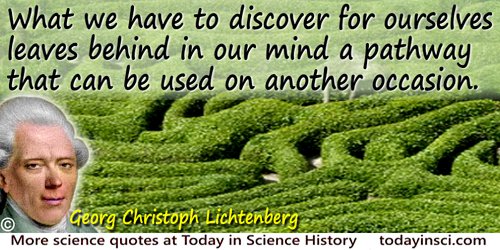
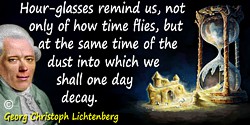
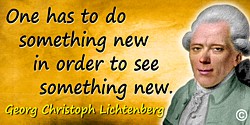
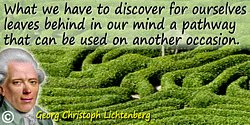
 In science it often happens that scientists say, 'You know that's a really good argument; my position is mistaken,' and then they would actually change their minds and you never hear that old view from them again. They really do it. It doesn't happen as often as it should, because scientists are human and change is sometimes painful. But it happens every day. I cannot recall the last time something like that happened in politics or religion.
(1987) --
In science it often happens that scientists say, 'You know that's a really good argument; my position is mistaken,' and then they would actually change their minds and you never hear that old view from them again. They really do it. It doesn't happen as often as it should, because scientists are human and change is sometimes painful. But it happens every day. I cannot recall the last time something like that happened in politics or religion.
(1987) -- 


